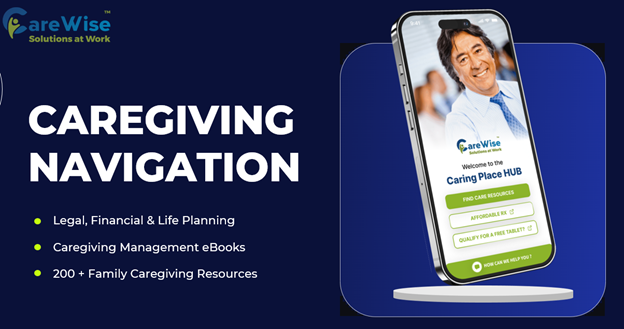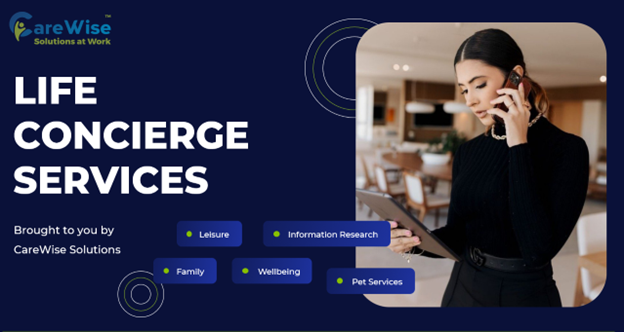Ten thousand boomers have their 65th birthday every day in America. At every stage in their lives, they disrupted infrastructure. We built schools and colleges. Housing and highways. Parks and shopping malls. Airports and transit systems. Television and media outlets. Office buildings and factories. And now we see more senior housing and skilled nursing facilities across the nation.
As boomers retire, the demographics of the workplace shift. This is the most significant workforce disruption we’ve seen in a century. But that is not the only disturbance, and not even the one impacting organizations the most.
Employees increasingly find themselves in a dual role, balancing their professional responsibilities with the demands of caring for aging loved ones.
Most still see this as a personal issue, a family problem. Perhaps even a healthcare industry issue.
But the workforce issue must be addressed as a separate and even more pressing problem!
This Labor Day, the CareWise Solutions team reflects on our commitment to the workforce, confronting a critical and stagnant issue—the glaring lack of support for employees and union members who balance work, self-care, life, and family commitments alongside caregiving for aging parents.
Despite clear expert recommendations, substantial shifts in workplace policies remain minimal.
During this once-in-a-century generational shift, we continue to address a caregiving challenge designed for 1970, not 2024. This era demands transformative changes. We are a working generation. Rarely is anyone readily available to undertake a 5+ year family caregiving role that escalates from part-time to a full-time commitment.
Flexible schedules and leaves are necessary but insufficient to relieve the excessive burdens of a profoundly mismatched societal need and an outdated industrial response.
The Growing Demand for Caregiving
As life expectancy increases, so does the number of elderly individuals requiring care. According to the World Health Organization (WHO), the number of people aged 60 years and older is expected to double by 2050, reaching 2.1 billion.
This surge has placed many working-age adults in the position of having to care for aging parents or relatives.
Impact on Employees and their Employers
For employees, the burden of caregiving is overwhelming. Dual responsibility leads to stress, burnout, and decreased productivity. Employees often face the difficult choice between career progression and providing care, with many opting for reduced hours, less demanding roles, or even leaving the workforce entirely.
- Employers see the signs that employed caregivers need support
- Increased Absenteeism and Presenteeism
- Career Sacrifices and Financial Strain
- Increased Turnover and Talent Shortages
- Requests for Flex Time and Remote Work
The Lag in Caregiving Support
Experts have long outlined essential services that could significantly alleviate the burdens on employee caregivers. Realistically, navigating healthcare should be the responsibility of the healthcare industry, not employers whose primary focus is to run profitable businesses and maintain effective teams.
Yet, employers are increasingly expected to fill these gaps. Essential services like concierge systems are vital to assist in managing critical life, family, and caregiving resources, including financial, legal, and life planning professionals. Most caregivers admit, “they don’t know what they don’t know.”
Training programs aimed at integrating work-life-career and care responsibilities have been recommended but inadequately adopted, leaving many employees to struggle in silence, compromising their productivity, well-being, and loyalty.
Proposed CareWise Solutions and Their Impact
CareWise Solutions offers a series of turnkey solutions for employers to reduce the impact of this workforce disruption in their organizations.
- Adoption of the Caring Place HUB: By integrating this mobile online dashboard into our benefits offerings, we can provide all employees with streamlined access to a wide array of resources. From social isolation busters to tech assistance for seniors, virtual healthcare, and pharmacy discounts, these tools alleviate stress and reduce the time employees spend away from work managing caregiving crises.
- Creating a Caregiving Innovations Marketplace: CareWise Solutions has forged strong relationships with entrepreneurs and traditional organizations within the health and caregiving sector, offering platforms that cater specifically to the needs of older adults and their caregivers, thereby advancing the caregiving innovation landscape.
- Training for Work-Life-Career and Care Integration: Building skills to achieve seamless integration of work, life, and caregiving responsibilities is essential. Implementing comprehensive training programs will empower family caregivers to manage their duties without fear of repercussions should they need to step away temporarily.
- Implementing an Employee Concierge Service: All employees, including those with aging care responsibilities, have access to a premium concierge service. Like having their own personal assistant, they receive personalized assistance for personal and professional tasks such as making travel reservations, event planning, arranging child and elder care, finding housing, home maintenance, and relocation services, booking event tickets, and more.
CareWise Solutions: A Model for the Future
As the only innovator in Wellness, Work, and Care Success, CareWise Solutions perfectly aligns with the models proposed by prestigious institutions like Stanford, Wharton, and Harvard.
“We are a working generation. This is not 1970—no one is readily at home to assume this long-term aging family caregiving role.
Unions and Employers must advocate for a cross-industry paradigm shift. We must decide if our nation truly wants to redeploy most of the workforce to home care for an average of 5 1/2 years, increasingly performing nursing roles that result in more care-related forced employment exits. An institutional choice needs to be made.”
~ Jeannette Galvanek, CEO of CareWise Solutions and former Chief Human Resources Strategy Officer at AT&T and Bell Labs.
In Conclusion
The time for tentative steps based on outdated assumptions about family and
work is over. Employees face increased stress, career sacrifices, and financial strain while employers grapple with higher costs and workforce disruption.
Our population continues to age. Businesses, unions, policymakers, and society as a whole must find solutions that support working caregivers so the workforce can adapt to these new realities.
This Labor Day, let us commit to bold strides towards a future where our workforce is empowered to live joyfully, with career and financial matters in order, ample time for personal life, and confidence that the care needs of loved ones are met with seriousness and effective outcomes.
Our collective efforts will define a legacy of strength, care, and resilience. Together, let’s transform our approach and make a significant impact.
Contact us today for more information about turnkey options to reverse the workforce disruption in your organization.








